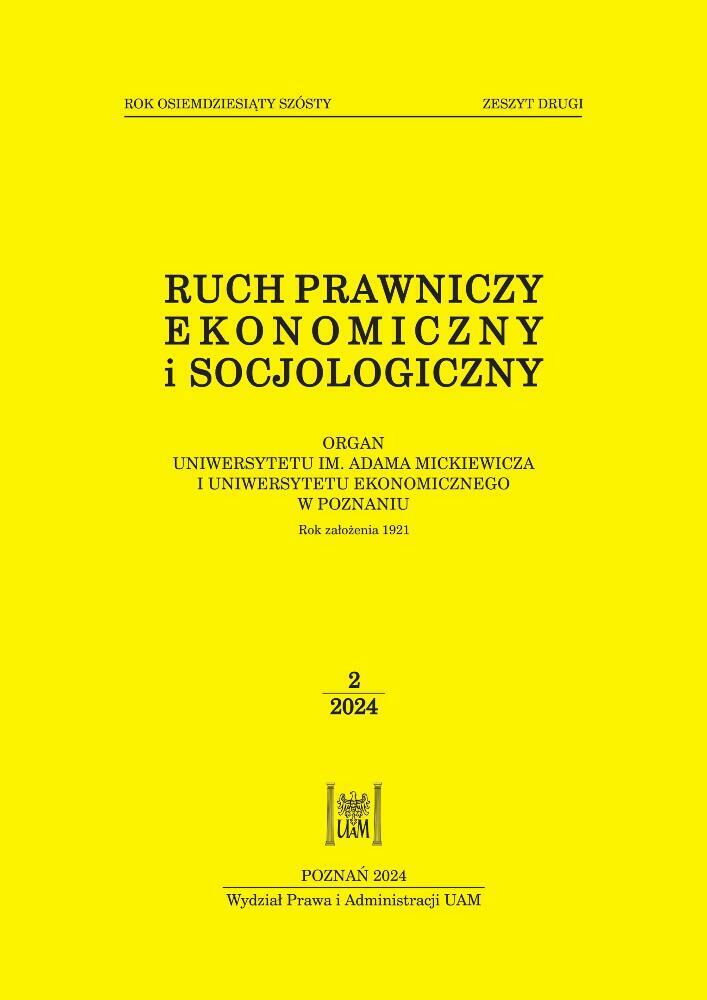Abstract
In 1997 the Polish Constitutional Tribunal held that the so-called ‘social premise’ for the permissible termination of pregnancy is unconstitutional. As the judgment had been issued before the 1997 Polish Constitution entered into force, one can raise some doubts concerning the legal importance of this ruling. The key question is: What are the effects of the first abortion judgment’ today? Does the 1997 Constitution preclude the introduction of the social premise? The paper aims to answer these general questions. The contribution to the doctrinal discussion is twofold. First, the paper offers a new interpretation of the effects of the first abortion judgment and certain provisions of the 1997 Constitution. Second, it challenges the view that this judgment and/or the Constitution exclude introducing the social premise for permissible abortion. The paper claims that the legal importance of the first abortion judgment to the legislator is less than constitutional doctrine and the Tribunal suggest. Taking into account the findings of the Constitutional Tribunal in this judgment, the legislator should not adopt the social premise in its exact 1996 wording. However, the constitutionality of the social premise as such should be recognized as unsettled.
References
Banaszak, B. (2012). Komentarz do art. 190. W: Konstytucja Rzeczypospolitej Polskiej. Komentarz. Legalis.
Bień-Kacała, A. (2022). Nieliberalny sąd konstytucyjny w Polsce na przykładzie wyroku Trybunału Konstytucyjnego w sprawie aborcyjnej, sygn. akt K 1/20. Przegląd Prawa Konstytucyjnego, 5(69), 15–27. DOI: https://doi.org/10.15804/ppk.2022.05.01
Bucholc, M. (2022). Abortion law and human rights in Poland: The closing of the jurisprudential horizon. Hague Journal on the Rule of Law, 14(1), 73–99. DOI: https://doi.org/10.1007/s40803-022-00167-9
Daroszewski, P. (2023). Reakcje sądów na pominięcie prawodawcze. Perspektywa Trybunału Konstytucyjnego. W: P. Jabłońska (red.), Pominięcia prawodawcze w procesie sądowego stosowania prawa (s. 22–39). Księgarnia Akademicka.
Florczak-Wątor, M. (2022). The constitutional review in a state pretending to be ruled by law. W: M. Belov (red.), Rule of law in crisis (s. 237–255). Routledge. DOI: https://doi.org/10.4324/9781003349501-16
Florczak-Wątor, M. (2023a). Komentarz do art. 2. W: P. Tuleja (red.), Konstytucja Rzeczypospolitej Polskiej (s. 29–35). Wolters Kluwer.
Florczak-Wątor, M. (2023b). Komentarz do art. 38. W: P. Tuleja (red.), Konstytucja Rzeczypospolitej Polskiej (s. 139–144). Wolters Kluwer.
Gliszczyńska-Grabias, A., i Sadurski, W. (2021). The Judgment that wasn’t (but which nearly brought Poland to a standstill): ‘Judgment’ of the Polish Constitutional Tribunal of 22 October 2020, K 1/20. European Constitutional Law Review, 17(1), 130–153. DOI: https://doi.org/10.1017/S1574019621000067
Grabowska-Moroz, B., i Łakomiec, K. (2021). (Nie)dopuszczalność aborcji. Glosa do wyroku TK z 22.10.2020 r., K 1/20. Państwo i Prawo, 76(8), 251–259.
Grabowski, R. (2006). Prawo do ochrony życia w polskim prawie konstytucyjnym. Wydawnictwo Uniwersytetu Rzeszowskiego.
Kondratiewa-Bryzik, J. (2009). Początek prawnej ochrony życia ludzkiego w świetle standardów międzynarodowych. Wolters Kluwer Polska.
Kozub-Ciembroniewicz, K., i Szumiło-Kulczycka, D. (2022). Czy aborcja naprawdę jest sprawą Konstytucji? Palestra, 10, 33–52. https://palestra.pl/pl/czasopismo/wydanie/10-2022/artykul/czy-aborcja-naprawde-jest-sprawa-konstytucji
Mączyński, A., i Podkowik, J. (2016). Komentarz do art. 190. W: M. Safjan i L. Bosek (red.), Konstytucja RP: Tom 2. Komentarz do art. 87–243. Legalis.
Młynarska-Sobaczewska, A. (2021). Unconstitutionality of access to abortion for embryo-pathological reasons. International Human Rights Law Review, 10(1), 168–179. DOI: https://doi.org/10.1163/22131035-01001005
Morawska, E. H. (2016). Zasada proporcjonalności. Komentarz. W: M. Derlatka, L. Garlicki i M. Wiącek (red.), Na straży państwa prawa. Trzydzieści lat orzecznictwa Trybunału Konstytucyjnego (s. 154–171). Wolters Kluwer.
Naleziński, B. (2023). Komentarz do art. 190. W: P. Tuleja (red.), Konstytucja Rzeczypospolitej Polskiej (s. 616–621). Wolters Kluwer.
Piotrowski, R. (2016). Zakaz przerywania ciąży. Komentarz. W: M. Derlatka, L. Garlicki i M. Wiącek (red.), Na straży państwa prawa. Trzydzieści lat orzecznictwa Trybunału Konstytucyjnego (s. 212–231). Wolters Kluwer.
Rakowska-Trela, A. (2021). Wyrok czy „niewyrok”. Glosa do wyroku Trybunału Konstytucyjnego z 22.10.2020 r., K 1/20, dotyczącego możliwości przerywania ciąży. Przegląd Sądowy, 6, 106–118.
Roszkiewicz, J. (2017). Prawo nasciturusa do życia w prawie konstytucyjnym i prawie międzynarodowym. Forum Prawnicze, 4(42), 97–124. https://forumprawnicze.eu/wszystkie-numery/2017/60-numer-4-42/232-janusz-roszkiewicz-prawo-nasciturusa-do-zycia-w-prawie-konstytucyjnym-i-prawie-miedzynarodowym
Sarnecki, P. (2016). Komentarz do art. 38. W: L. Garlicki i M. Zubik (red.), Konstytucja Rzeczypospolitej Polskiej. Komentarz (tom 2). Lex/el.
Sroka, T. (2016). Komentarz do art. 38. W: M. Safjan i L. Bosek (red.), Konstytucja RP: Tom 2. Komentarz do art. 1–86. Legalis.
Sunstein, C. R. (2015). There is nothing that interpretation just is. Constitutional Commentary, 30(2), 193–212. https://scholarship.law.umn.edu/concomm/120/
Szumiło-Kulczycka D., i Kozub-Ciembroniewicz, K. (2021). Konsekwencje uchybień w obsadzie TK (uwagi na tle orzeczenia w sprawie K 1/20). Państwo i Prawo, 76(8), 81–100.
Zubik, M. (2007). Ochrona prawna początku życia człowieka w rozwiązaniach międzynarodowych i konstytucyjnych w Europie. Przegląd Sejmowy, 3(80), 21–44.
License
Copyright (c) 2024 WPiA UAM

This work is licensed under a Creative Commons Attribution 4.0 International License.





